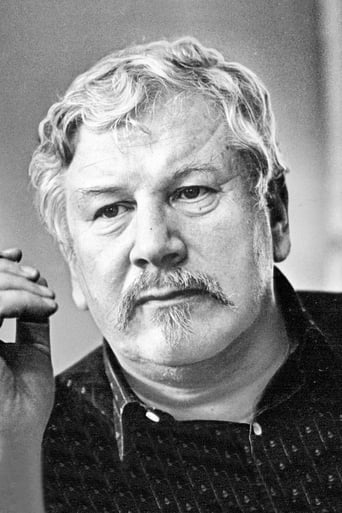Wordiezett
So much average
Rio Hayward
All of these films share one commonality, that being a kind of emotional center that humanizes a cast of monsters.
Fatma Suarez
The movie's neither hopeful in contrived ways, nor hopeless in different contrived ways. Somehow it manages to be wonderful
bob9354
This is an incomplete review as my wife and I could only take about an hour and a half of it. As for the acting, it's not bad for an older movie. The problem we had with the movie, and it's a major one for us, is that Christianity is wrongly portrayed. I realize that it may not be a problem for everyone, but Christianity is portrayed, pretty much as Judaism. If the faith of the female lead were Jewish, I would have been able enjoy the movie. But to have her portrayed as a Christian, and yet Christianity portrayed as a list of do's and don't's, takes away from the impact of the movie. I know that many would ask me, "What do you mean? Christianity IS a list of do's and don't's." And I know that's what a lot of people think it is. But Christianity is about how humanity cannot reform themselves... that we are separated from God by our rebellious hearts and wills...that there is only one way for us to return to a relationship with God...and that is to trust in what Jesus did for us on the cross. We don't reform ourselves to be acceptable to God. That's impossible. We accept the free offer of forgiveness that Jesus extends to us. We accept His forgiveness, and only then can we enter into a whole new relationship with Him...having the guilt for our shortcomings and rebellion cast as far as east is from west.But the movie portrays Christianity as a religion in which the followers of Jesus simply do the right thing.
JohnHowardReid
Copyright 4 December 1951 by Loew's Inc. An M-G-M picture. New York opening simultaneously at the Astor and Capitol: 8 November 1951. U.K. release: 28 September 1952. Australian release: 19 December 1952 (sic). Sydney opening at the Liberty. 171 minutes.SYNOPSIS: In the first century A.D., Marcus Vinicius, commander of the victorious Roman legions, returns to Rome after his conquests in Britain. He is honored by the Empress Poppaea. Soon he meets and falls in love with Lygia, a Christian hostage and the daughter of a defeated king. She spurns him because of his pagan ways. He the contrives to have Lygia given to him as a slave. But she still refuses to yield to him. Later Marcus follows Lygia to a meeting of the Christians where a sermon by the apostle Peter gives him a better understanding of her religious beliefs. She eventually falls in love with Marcus and consents to become his wife. However, he leaves her in anger when she refuses to abandon her Christian faith. Yet when the mad Emperor Nero sets fire to Rome, Marcus rushes to Lygia's rescue. NOTES: Negative cost: $7 million (including $2 million for an abandoned 1949 version produced by Arthur Hornblow and directed by John Huston, starring Gregory Peck and Elizabeth Taylor).Initial domestic rentals gross: $10.5 million, making it number 2 at the U.S./Canadian box-office for 1952. Equal 4th (with another Robert Taylor epic Ivanhoe) at U.K. ticket windows.Nominated for the following prestigious Hollywood awards: Best Picture (lost to An American in Paris); Best Supporting Actor, Leo Genn (lost to Karl Malden in A Streetcar Named Desire); Best Supporting Actor, Peter Ustinov; Best Color Cinematography (lost to An American in Paris); Color Art Direction (Also lost to An American in Paris); Film Editing (lost to A Place in the Sun); Music Scoring of a Drama or Comedy (also lost to A Place in the Sun); Color Costume Design (lost to An American in Paris).Number 8 in The Film Daily's annual poll of American film critics. Number 9 on the National Board of Review's Ten Best list.Filmed in Italy, at Rome's Cinecitta Studios.COMMENT: This, the first and only sound version of a once super- popular 1896 novel, inaugurated the Hollywood craze for spectacles. It established a formula, faithfully followed in most other epics of ancient and medieval pageantry: (1) Pots of money spent on sets, effects and costumes; (2) prestige actors in lead roles; (3) an always super-glossy but only occasionally imaginative technical finish; (4) an invariably weak script, often with quasi-religious shadings, in which one-dimensional characters muse at length in quaint English on the meanings of love, life, commitment and destiny.Quo Vadis is more entertaining than most of its successors. Although the love story is even more flaccid than usual — Miss Kerr makes her heroine boringly insipid — it does have some uncommonly strong performances, especially from Peter Ustinov, Leo Genn (this was the movie that made them both super-stars, though Mr Genn's reign proved less durable than the far more flamboyant Ustinov's), Patricia Laffan, Buddy Baer (his best role ever), and the ever-reliable Robert Taylor.On the whole, it's Ustinov who makes the most impression. His is by far the most colorful character. He has all the best business and lines — and makes the crowd-pleasing most of them!And of course there's the spectacle elements: richly vivid sets, hordes of extras, see Nero fiddling whilst Rome burns, Christians thrown to the lions, all that sort of stuff, expensively re-staged — and indelibly cheapened in the process. AVAILABLE on an excellent Warner DVD.
Nicolas F. Costoglou
This movie is HUGE, many of the scenes are (still) breathtaking and very well made.The best part of the movie is the dramatic presentation and the intense interactions between the characters, who are all very well written.The actors all do a fantastic job, most of all Peter Ustinov, who plays a terrifyingly vindicated Nero.The musical score fits the very good cinematography perfectly, so are the costumes and enormous sets.The story is very dramatic and has some very interesting themes about believe and Christianity, which seems preachy, but works in the context of the story and setting.The practical effects and model-shots are amazing for the time, and the bluescreen effects are noticeable but very clean.This movie is grand in scale and very dramatic, like a monumental tale should be...
writers_reign
What a colossal bore. I've just spent the thick end of three hours watching at most - and being generous - three minutes of half-decent cinema. Presumably it was 'sold' as spectacle and if that's true then they really SHOULD have gone to Specsavers. What it is is TALK and then MORE talk and nothing worth hearing. It's just possible with two half-decent leads as opposed to the wooden Taylor and the insipid Kerr it might have been watchable, say Lancaster or Douglas opposite Ava Gardner. As it is the only diversion is looking for the uncredited Liz Taylor and/or Sophia Loren. Ustinov walks away with it of course but given the role as written even Arthur Mullard could have made a respectable stab at it. Finlay Currie and Felix Aylmer in one movie is also notable though not enough to make it watchable. Maybe if they'd turned the lions loose at the first pre-production session it would have done us all a fovour.








